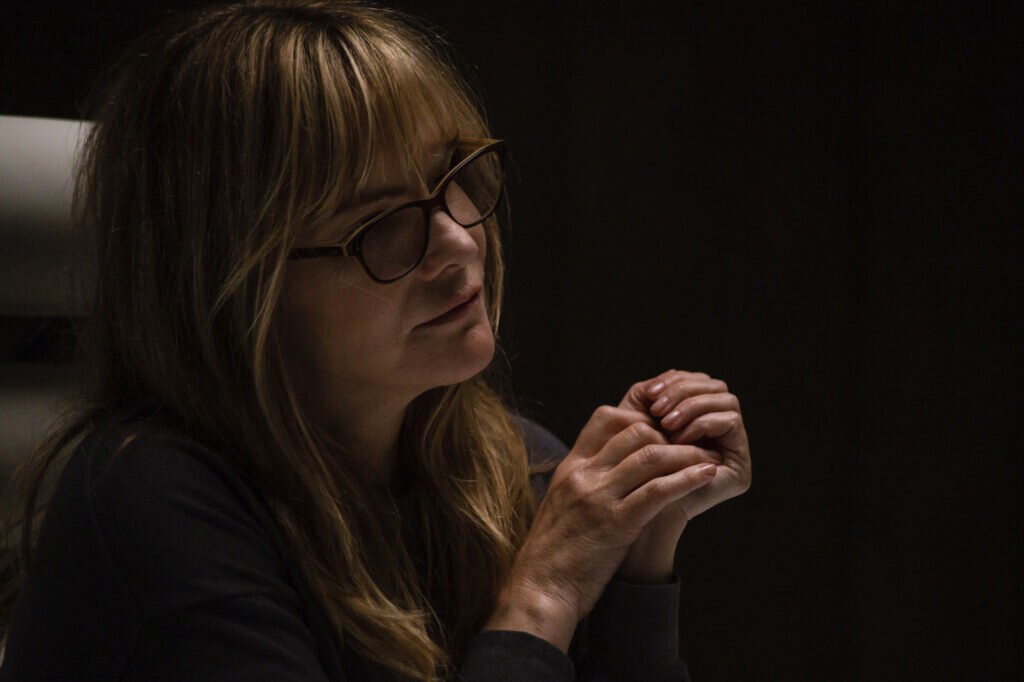2020 | UK/Canada | Directed by Brandon Cronenberg
Logline: An assassin working for a secret organisation that uses elaborate mind control finds herself in a dire situation after a job goes awry.
The mind is a terrible thing to waste.
Brandon Cronenberg’s second feature is a shocking work of art, a rupture and a rapture of ultraviolence, unlike anything you’ve seen in recent years. The most confronting depiction of cruelty since Gaspar Noe’s Irreversible, and in many ways, much of Possessor reminds me of the stylistics and tone of European extreme cinema. I can’t think of any other North American mainstream release as graphically nightmarish as Brandon Cronenberg’s assault on the senses, and I applaud him for his audaciousness. This is the most refreshing experience - in the most traumatic way - I’ve had in the cinema in years, apart from Darren Aronofsky’s Mother!
Tasya (Andrea Riseborough) works for an unnamed clandestine organisation that specialises in highly elaborate assassinations for high-paying clients. Using futuristic technology that enables them to implant a neural network device into an abducted host’s brain, the victim is then surreptitiously planted back into their normal lives. They awake under the control of the secret organisation’s trained operative who is lying remote and prone with a hi-tech helmet, but now controlling the every move of the host, who can now easily infiltrate the world of the intended victim and carry out their assigned assassination.
In the movie’s opening scenes we witness a woman named Holly (Gabrielle Graham) carrying out an assassination, as she viciously stabs a wealthy attorney to death, then struggles to commit suicide using a gun she was carrying, ending up shot to death by police. This is our introduction to the world of Tasya the assassin, and her boss, Girder (Jennifer Jason Leigh), who subsequently takes Tasya through a debriefing in order to maintain her psyche is intact. The next job, involving a host, Tate (Christopher Abbott), his fiancée Ava (Tuppence Middleton), and her very rich magnate father, John Parse (Sean Bean), is an important one, and it’s crucial that Tasya is in top form.
It’s obvious as the narrative of Possessor unfolds that the apple hasn’t fallen far from the tree. Brandon Cronenberg is fascinated by many of the same themes and elements that occupy his father’s films; the use and misuse of advanced technology, mysterious companies and/or clinics, psychosexual obsession, disease, affliction, and the corruption of the body, and the mutation and permutations of mechanics and organics, the architecture of nihilism and human frailty.
Brandon has revealed that Possessor was partly inspired by a non-fiction book from the 70s on mind control via radio command, and how behaviour, especially aggression and hostility, can be aggravated, manipulated, transmogrified. He also took elements from an earlier short he made, titled Please Speak Continuously and Describe Your Experiences as They Come to You, which focused on a woman with a psychiatric brain implant reliving dreams, but experiencing confusion and apprehension.
Possessor operates like a kind of fever dream. There are more questions than answers, but, much like the cinema world of David Lynch, the hows and whys are less important than the heres and nows. This is a psychological journey, a most tenebrous and ghastly experience, made exhilarating and utterly compelling in the most visceral, horrific way. The viewer is forced to experience much of the disconnect and cerebral breakdown as the host/possessor sees it. Cronenberg achieves this through the use of incredibly graphic and realistic special effects makeup and stylised in-camera optical effects. The results are truly outstanding.
Karim Hussain’s cinematography is brilliant, some of the most innovative techniques I’ve seen in a long time. Equally, special makeup effects designer, Dan Martin, has delivered some of the most imaginative and shocking body horror. These two need to win awards for their work. Seriously. But, credit must go to Cronenberg for having the savvy on how to direct these elements so that they achieve maximum effect on screen. Which they do, in spades.
Uniformly superb performances from the whole cast, some familiar faces, and others less so. More terrific music from the talented Jim Williams, who scored Raw, Beast, and Kill List, amongst others. Cronenberg surrounds himself with the best in the business, and the results are plain to see.
But Possessor is not an easy recommendation. The sheer level of realistic violence will be too much for most. Even I found some of it truly grimacing, and I’m a hardened horrorphile. I’m sure the biggest criticism will be over the premise and why would they go to such expensive lengths to assassinate when they could simply hire a skilled patsy? Why is everything so seemingly complicated? Christopher Nolan’s Inception comes to mind. But Possessor runs deeper than that, more concerned with the existential concepts of what makes and unmakes us as humans and the dilemma and fragmentation of guilt.
Taking inspiration from his father’s virtual reality game thriller eXistenZ and the techno-horror of Shinya Tsukamoto’s nightmarish Tetsuo: Iron Man and Body Hammer movies, Possessor ends up a tragic tale of human error in a world of increasing corporate possession and manipulation - data mining and AI - reflecting the darkest mirror of society.
It’s a mindrape about the primal senses; rage and the libido, but also about memory, empathy, and rejection. It implants itself as a firm favourite of the year, of the new millennium, even. Get involved. If you dare.





